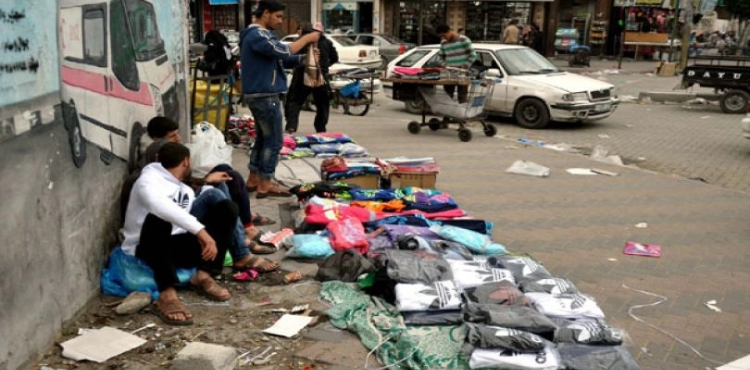Gaza _ Palestine News Network
A report by the United Nations Agency for Trade and Development (UNCTAD), economic reality in the occupied Palestinian territories and Gaza Strip in 2018, described it as "darker" than ever.
According to the agency´s annual report, published on their website, Palestinian citizens are trapped in an unhorizon economy in which unemployment grows, especially in the Gaza Strip, which suffers from a stunted development.
The unemployment rate in the Palestinian territories had reached 27.4 per cent in 2017, the highest in the world, while agricultural production had declined by 11 per cent.
The report noted that half of the Palestinians under 30 years of age were unemployed, the economy had grown 3.1 per cent, but there had been little change in terms of per capita income.
Incremental Join
The report noted that, in 2017 and the beginning of 2018, settlement construction had accelerated, despite the United Nations General Assembly resolution of 21 December 2017, in which the General Assembly confirmed that "any decisions and actions claiming to have changed the character and status or demographic composition of the city Holy Jerusalem has no legal effect, it is null and void and must be abolished in accordance with the relevant Security Council resolutions. "
The report confirmed a growing annexation of large portions of the West Bank, including the transfer of Israelis to settlements, the forcing of the Palestinian population, the investment of more than $19 billion in settlement construction and the extension of Israeli domestic jurisdiction.
"Gaza " Siege for ten years
The report says that with the siege now in its 11th year, the Gaza Strip has been reduced to a humanitarian situation of deep suffering and dependence on aid, and "the productive capacity was eliminated through three major military operations and a naval, naval and ethnic blockade."
The report states that the Israeli military operation 2008-2009 has besieged more than 60 per cent of the total productive capital in Gaza, and the recent war has destroyed one percent of what remains.
Destructive production assets include roads, power plants, industrial and commercial facilities, agricultural land, as well as other infrastructure and related assets.
In 2012, the United Nations warned that unless current trends were reversed, Gaza would become uninhabitable--unfit to live in human beings--by 2020. Since then, the report says, all social and economic indicators have deteriorated and the situation in Gaza is now worse.
The report added that real real income per capita in Gaza was 30 per cent lower than at the turn of the century, leading to widespread poverty and food insecurity, despite the fact that 80 per cent of people received social assistance.
Moreover, the protracted electricity crisis in Gaza has deepened. In early 2018, families received, on average, two hours of electricity per day, and shortages continue to seriously affect daily life by disrupting productive activities and impeding the delivery of basic services.
The report of UNCTAD states that in order to ensure sustainable recovery, it is necessary to lift the Israeli blockade in full, to reunify Gaza and the West Bank economically, to overcome the energy crisis as a matter of priority and to develop the marine natural gas fields in the Mediterranean Sea discovered in the 1990s.
Shackled trade
According to the report, Israeli restrictions on Palestinian trade include the dual-use list, which does not allow Palestinians to import a wide range of civilian goods that may have a possible military application.
The list includes basic production inputs such as civil machinery, spare parts, fertilizers, chemicals, medical equipment, household appliances, telecommunications equipment, metals, steel pipes, milling machines, optical equipment and navigational aids.
This embargo imposes heavy economic costs and exacerbates conflict and political instability by undermining employment, wages and the livelihood of the Palestinian people.
The report warns that the mere removal of Israeli restrictions on Palestinian trade and investment could allow the region´s economy to grow by as much as 10 per cent, while the current situation can only ensure that unemployment continues at the level of recession and extreme poverty.
The unequal customs union
The report said that the customs union between Israel and the Palestinian territories isolated the Palestinian economy from the rest of the world´s markets, and made it dependent on Israel
Between 1972 and 2017, Israel absorbed 79 percent of the total Palestinian exports and accounted for 81 percent of Palestinian imports, the report said.
The report recommended replacing the outdated customs union with a new framework that would guarantee the Palestinian Authority full control over its customs territory, borders and trade and industrial policies.
The call for more fiscal austerity would discourage growth, raise unemployment without affecting the trade deficit, lead to significant losses and increase pressure on the already fragile social, economic and political conditions in the Occupied Palestinian territory, he warned.
The report said international aid fell dramatically from $2 billion in 2008 to 720 million dollars in 2017.
The Palestinians received a new blow this month when US president Donald Trump stopped funding the United Nations Relief and Works Agency for Palestine Refugees (UNRWA), resulting in a shortfall of some 200 million dollars












